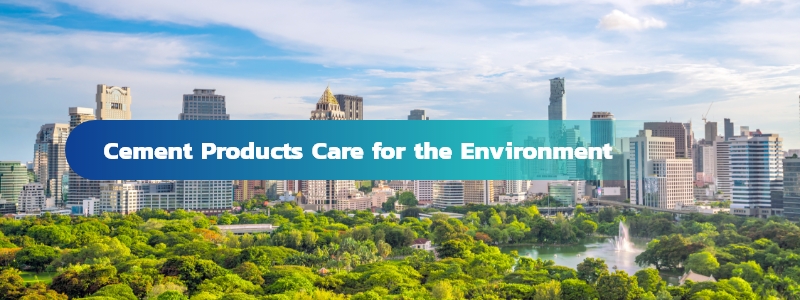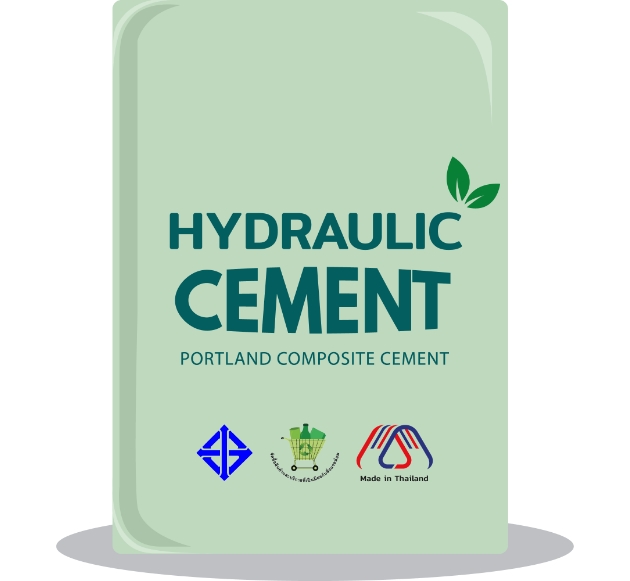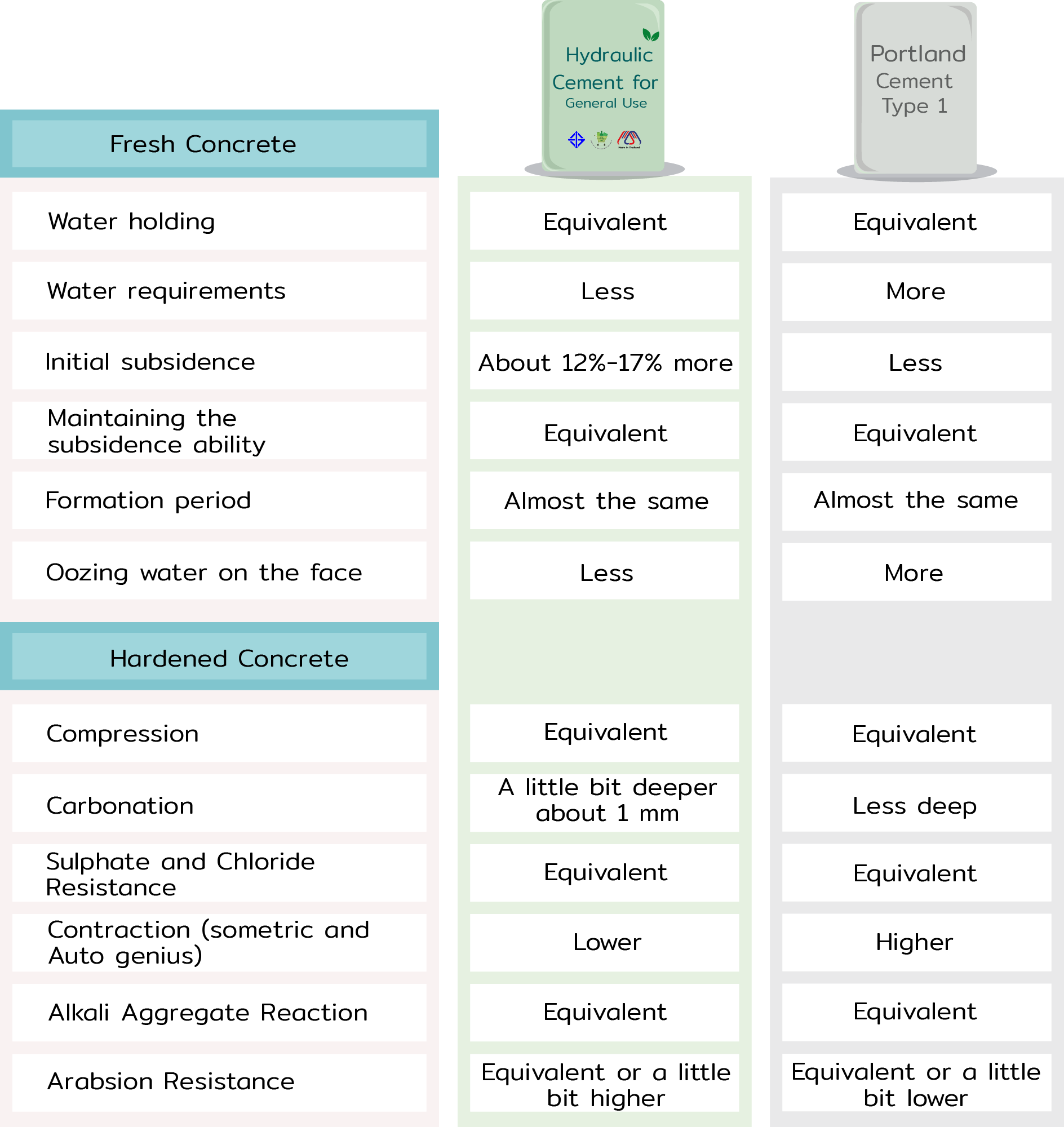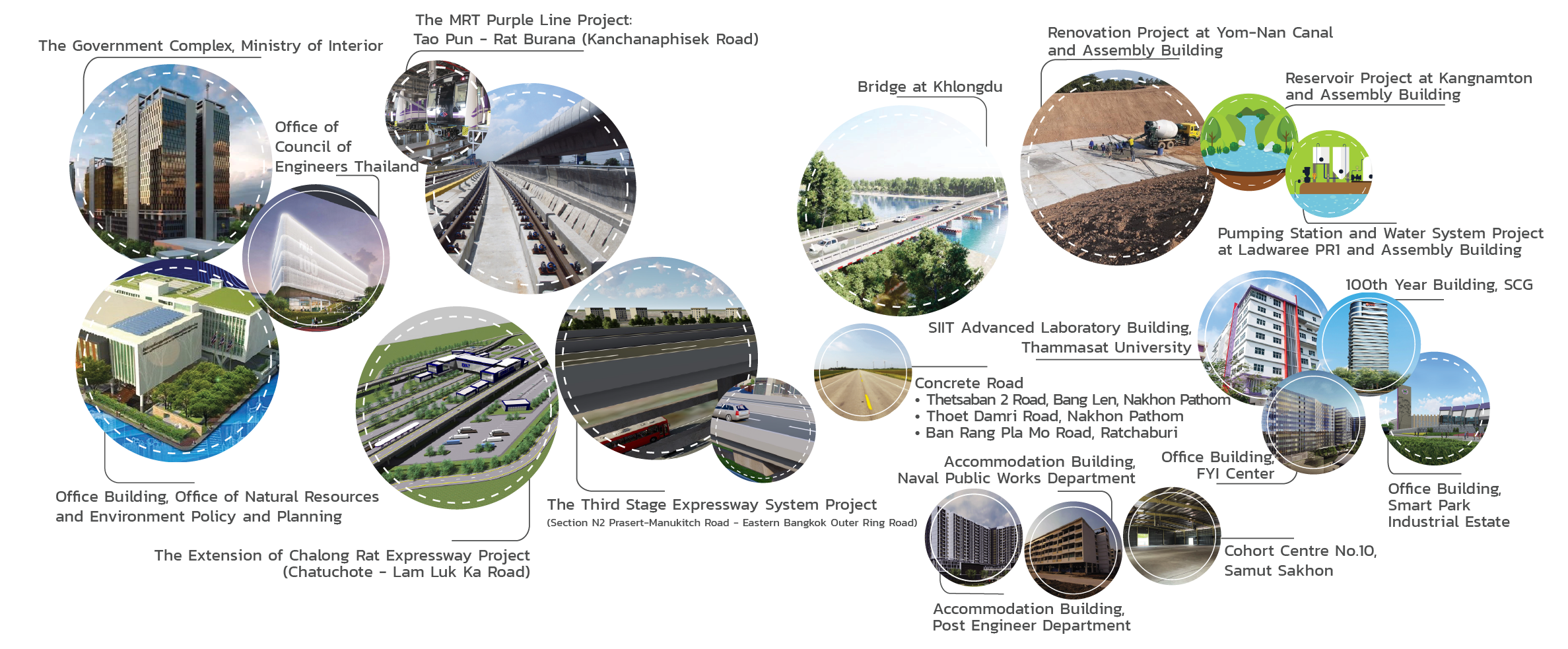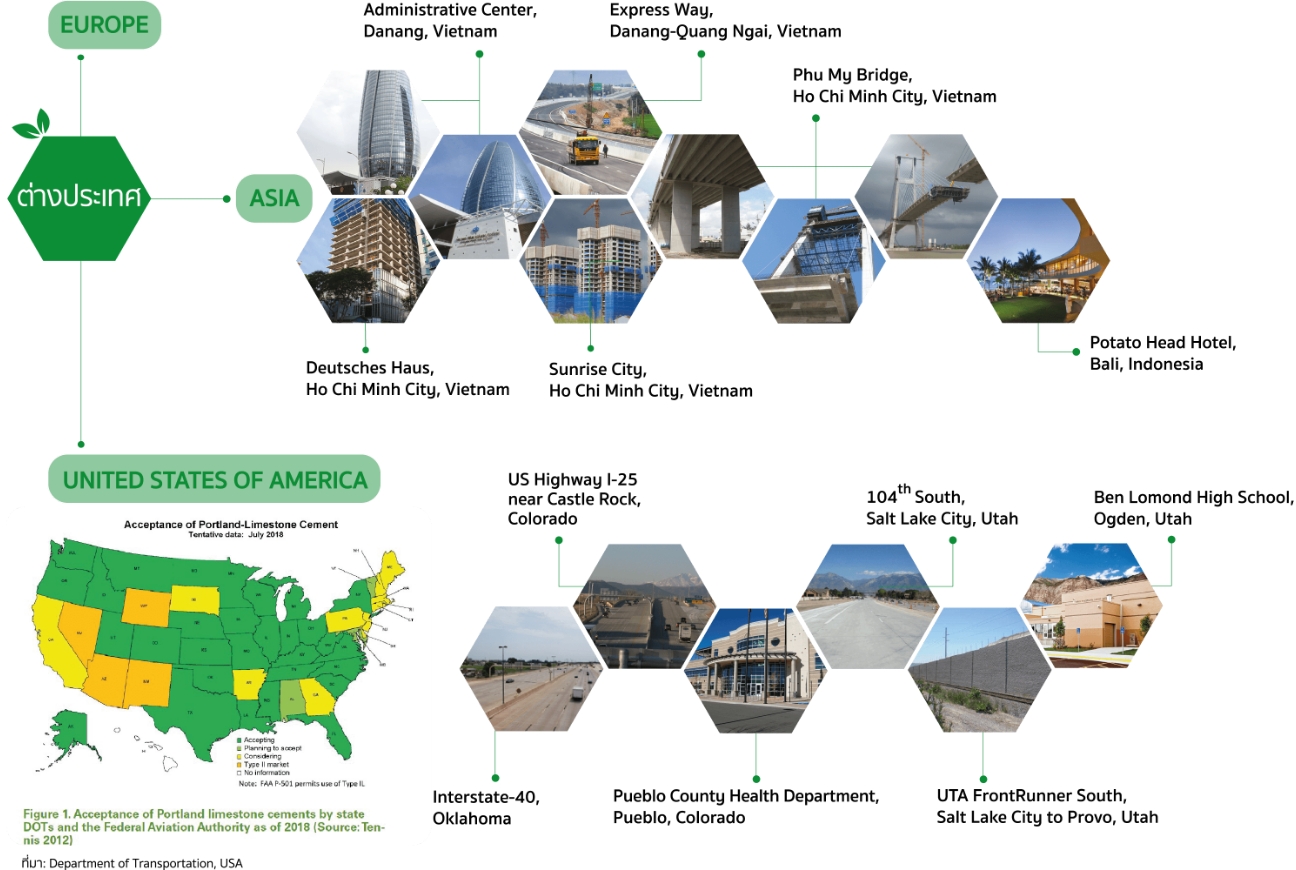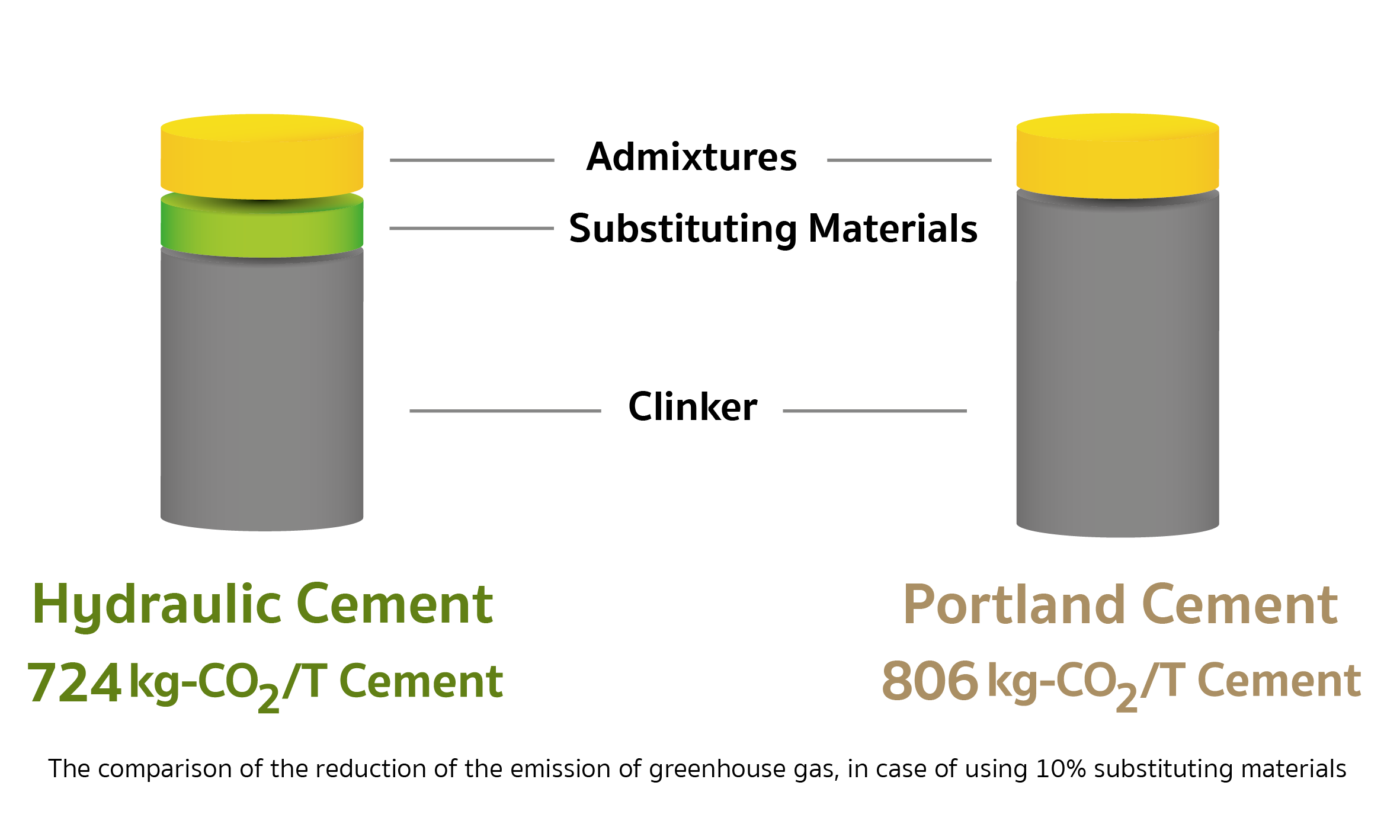|
|
|
Hydraulic Cement:
a Low Carbon Cement Product to Reduces Greenhouse Gas
Hydraulic cement means the cement which forms and hardens from reacting with water and has the same capacity when it is in water, with the attribute as according to the industrial product standard TIS 2594 which is defined by Thai Industrial Standard Institute, Ministry of Industry since the year 2013 It is having same production process of Ordinary Portland Cement (OPC) but focuses on performance based and can significantly reducing greenhouse gas.
|
The Standard of Hydraulic Cement: TIS 2594
The hydraulic cement which is produced as according to Thai Industrial Standard TIS 2594 of the Ministry of Industry which refers to ASTM C1157 of the USA which focuses more on performance based than on prescriptive based.
In order to control the quality standard and to build up confidence among users of hydraulic cement, TIS 2594 defines that cement manufacturers have to control the quality of strength as according to the specified age and to control the expansion of cement at the age of 14 days, which is the advantage of hydraulic cement TIS 2594 which its effectiveness can be developed to respond to the need of each type of construction as according to its objective.
|
|
|
The Standard of Construction Engineering
Ministry of Interior, Department of Public Works and City & Town Planning
- The standard defines the specific attribute of the materials in building structure DPT.1101-64 to DPT. 1106-64.
Ministry of Transportation, Department of Highways
- The standard on soil cement base DH-S 204/2021
- The standard on soil cement subbase DH-S 206/2021
- The standard on cement concrete road DH-S 309/2022
- The standard on cement treted base DH-S 214/2023
Ministry of Transportation, Department of Rural Roads
- The standard on concrete and reinforced concrete works DRR. 101-2563
- The standard on concrete pavement DRR. 231-2564
| Ministry of Transportation, |
the Mass Transit Authority of Thailand |
| |
Expressway Authority of Thailand |
- Construction drawing which defines to use hydraulic cement.
Ministry of Agriculture and Cooperatives, Department of Irrigation
- Specification on Concrete Work
The Engineering Institute of Thailand under H.M.The King's Patronage
- Specification on Standard of Materials and Construction for Concrete Structures 2022: EIT Standard 011014-22
|
|
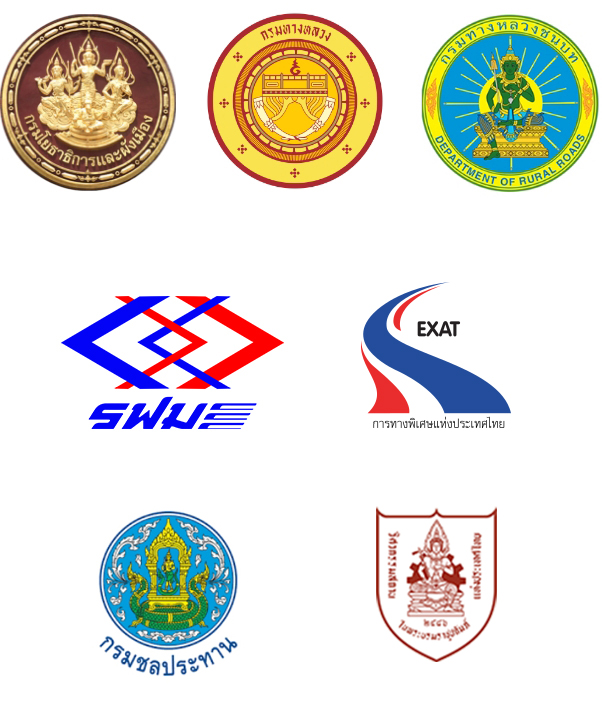
Hydraulic Cement Received Certification in the Following Fields

Thai Industrial Standard TIS. 2594 |
|

Environmental Friendly Product |
|

Made in Thailand Product (MiT) |
The Attribute of Concrete which is Produced from Hydraulic Cement
The Strong Points of Hydraulic Cement
 |
Can be used to substitute Portland Cement. |
|
|
 |
Dense concrete which results in stronger structure. |
|
| |
 |
Reduce the emission of greenhouse gas. |
|
|
 |
Abrasion and slippage resistance. |
|
| |
 |
High compression which suits to various types of structure. |
|
|
 |
Smooth concrete surface. |
|
| The Thai Cement Industry and Its Readiness
With the strong determination in running environmentally friendly industry, cement manufacturers have conducted researches and development and have introduced technology in production processes which create the product called “hydraulic cement” which can be used in substitution of Portland cement.
Every cement manufacturer is ready to produce hydraulic cement to respond to the demand of users.
|
Usage Thailand
Ministry of Agriculture and Cooperatives, Royal Irrigation Department
- The Construction Project on Large Water Supply System on the Left Side of the Project on Phajuk Divert Water Dam, Uttaradit Province.
Ministry of Defense, the Office of the Permanent Secretary of Defense
Ministry of Defense, Royal Thai Armed Forces Headquarters, Military Services Operations Department
- The Project on Area Development
Srinakharinwirot University
- Road and Drainage System Improvement
Foreign Countries
The Advantages and Disadvantages of Hydraulic Cement
- It has engineering attribute which is verified by various standards responding to the demand of each type of construction on performance based better than Ordinary Portland Cement.
- It helps reduce the emission of greenhouse gas significantly which will lead to sustainable development of cement industry and the construction industry in the future which is beneficial to environment in terms of cost-effectiveness and it can be said that hydraulic cement is the cement that completely answers the proposition of sustainable development.
- It is the use of resources wisely which leads to the maximum benefit as according to circular economy leading to low carbon society. Besides, it supports the implementation in reducing greenhouse gas of Thailand which aims to become carbon neutral in the year 2050 and to become zero net emission country in the year 2565.
|
The Document on Saves the World by Hydraulic Cement

|
|
Cement Industry and the Sustainable Development, on the Part of Knowing “Hydraulic Cement”
|
Frequently ask questions
| Q.1 |
What are the substituting materials for producing hydraulic cement? |
| |
Currently, Thai manufacturers used calcium components such as calcium carbonate, limestone, slaked lime, lime, dust from clinker kiln because of the readiness in both reserved quantity and quality. The substituting material appears on cement bag or on delivery note or certificate or others which have been agreed upon between buyer and manufacturer. |
| |
| Q.2 |
Are the production process of hydraulic cement different from the production process of Portland cement? |
| |
They are not different, in producing hydraulic cement, the manufacturers have conducted research and development, as well as using cement grinding technology to modify the nature of substituting materials to control the quality as industrial product standard set and to respond the objective in performance based. |
| |
| Q.3 |
How can hydraulic cement reduce the emission of greenhouse gas? |
| |
In cement production process, there is materials burning to make it into clinker, which is the process that emits carbon-dioxide, so the utilization of lesser clinker will help reduce CO 2
|
| |
| Q.4 |
How can users be assured of the consistent quality? as no chemical properties have been set for hydraulic cement TIS 2594 |
| |
Hydraulic cement TIS 2594 is under many quality-controlling measures which are higher than that of Portland cement such as in the fields of compressive strength, and expansion which can be assured that hydraulic cement has quality controlling measures, though chemical properties have not been set. |
| |
| Q.5 |
If Portland cement is currently in used can it is immediately changed to hydraulic cement? |
| |
Yes, it can be changed immediately since hydraulic cement is designed to replace Portland cement. |
| |
| Q.6 |
What is the price of hydraulic cement when comparing to Portland cement? |
| |
|


